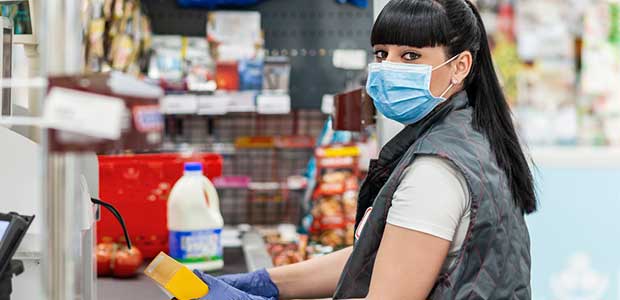
How to Talk to Your Employer About Coronavirus Concerns at Work
Worried about contracting the virus at work? Here are some things you can do and some recommendations for approaching the situation.
With many essential workers already upholding grocery stores, hospitals, banks and post offices, many more workers will soon go back to work (if they already haven’t) in places like restaurants, gyms, movie theatres and more. If you are like many, you might be worried about your health if you are asked to return to work. How do you talk to your employer about it?
Many state agencies that handle workplace complaints are backlogged with COVID-19 complaints. However, there are still some things you can do, according to one article.
First, the basics. What PPE am I entitled to?
OSHA requires employers to provide workers with PPE to keep them safe. However, the type of gear you are entitled to depends on the risk of exposure.
Workers who are exposed to confirmed or suspected COVID-19 cases and are performing jobs that can aerosolize the virus—intubating a patient, for example, or performing an autopsy—should wear a respirator, eye protection, gloves and gown, according to the Centers for Disease Control and Prevention.
The same gear recommendations apply to doctors, nurses and healthcare support staff working with or near a COVID-19 patient, medical transport workers and mortuary workers, says the CDC.
However, given the shortage of N95 masks, the CDC advises giving N95s only to workers who perform the highest-risk jobs.
The CDC recommends cloth masks for workers exposed to travelers or who have jobs at grocery stores or other high-volume retail environment where they are within six feet of others.
The CDC says grocery store workers need to wear gloves only if they work in food preparation. Everyone needs to perform proper hand hygiene and regularly wash hands or use sanitizer.
Should I approach my employer with concerns about coronavirus exposure?
Not by yourself. It is best for workers to approach their supervisor in a group so they can communicate the issue as a collective problem. Plus, a group of workers who speak with their employer about safety concerns have some legal protection against retaliation.
“If there’s an issue in the workplace, never address something on your own with an employer,” said Alice Berliner, coordinator for the Southern California Coalition for Occupational Safety and Health, an advocacy group. “That is when you’re most vulnerable.”
So, who should I reach out to for support?
Labor experts say workers can talk to their coworkers about what they’ve noticed and questions they have about health and safety issues. If there’s an overarching principle, it should be “don’t do it alone.”
If unionized, workers can also reach out to their union representatives. Workers not represented by a union can also reach out to worker centers or community advocacy groups for advice and connections.
Can I file a state OSHA complaint?
Workers have the right to file a complaint with the state’s Division of Occupational Safety and Health. The agency is to keep the person’s name confidential unless the person requests otherwise.
Usually, a complaint merits an inspection by the state’s agency inspector. The inspector can also interview employees there to hear more about the working conditions. If there is enough evidence, the state’s agency could issue a fine. The entire process can take months, but sometimes a visit from an inspector will lead an employer to fix problems.
However, many states’ worker advocacy groups are overwhelmed with COVID-19 workplace concerns. Still, it’s best to file a complaint and have it “official” than treat it as if there is no problem.
Are there other options?
Workers can also file a report with their county’s department of public health. These county departments are focused on protecting the public’s health, unlike state OSHA agencies.
“It becomes an issue that’s also about your situation but also is a real mushrooming public health concern because of the exposure of so many other people,” said a source from the article.
Workers can also try contacting media organizations if their workplaces have a number of COVID-19 cases.
Could a lawsuit lead to a workplace change?
It could, though building a solid case would take a lot of documentation as well as witness and expert testimonies, said the article.
Still, there are fines, settlements and other situations that come out of complaints, inspections and lawsuits. Read the article to find out more.
What if my co-workers have tested positive for COVID-19?
Anyone whose co-workers test positive for the coronavirus should contact their local public health department for guidance. CDC guidelines direct employers to inform workers if there has been a confirmed case of COVID-19 infection within the workplace, but they are required to maintain confidentiality—not announce the infected worker’s name. Employers should identify potentially exposed employees and alert them directly.